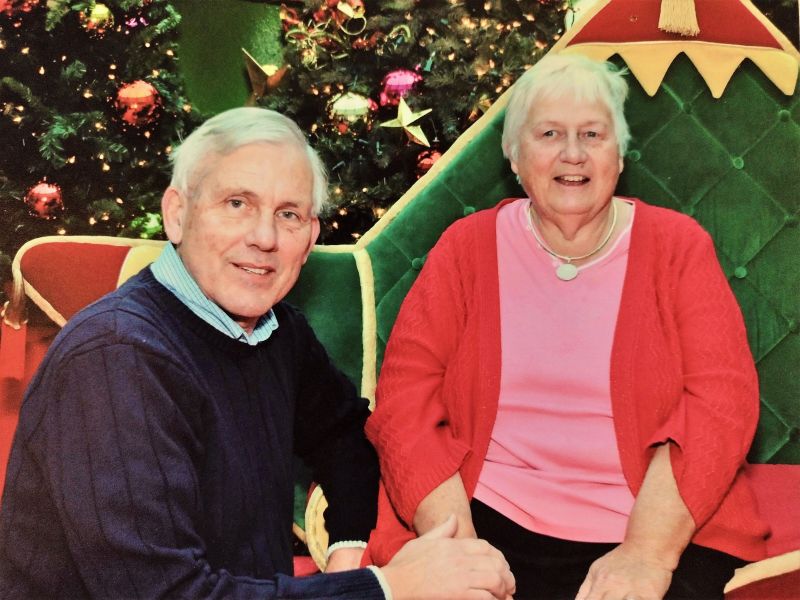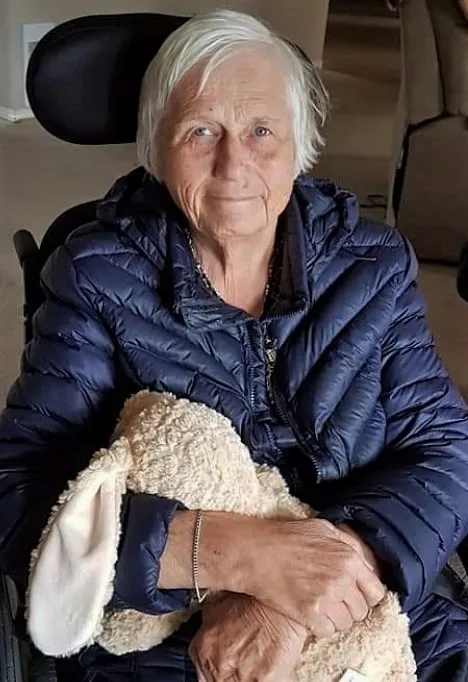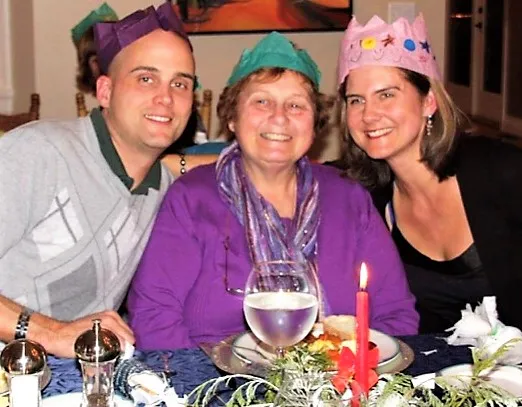
Vancouver, Canada, Feb 7, 2023 / 15:10 pm (CNA).
Richard Leskun remained at his wife Marilynn’s side nearly 24 hours a day after she was admitted to Abbotsford Regional Hospital, the result of a fall from her wheelchair.
Over the next several days Leskun found himself not only caring for his 71-year-old wife but also fending off efforts by medical staff to let her die, before they offered to do the job themselves.
The Sunshine Coast widower is sounding the alarm over what he says is a shocking and dangerous bias in the medical system toward the promotion of death for sick and elderly patients.
Leskun, 75, made the charge after he said medical staff at the Abbotsford hospital “pressured” and “badgered” him to allow his wife of 50 years, Marilynn, to die, and then suggested that he let her be euthanized.
Already fragile from the debilitating effects of dementia, Marilynn, 71, had entered the hospital after falling from her wheelchair and breaking vertebrae in her neck.

Leskun, who was a member of St. James Parish in Abbotsford at the time and now lives in Secret Cove, told The B.C. Catholic in an interview that over the course of eight days staff asked him five times whether they could place a do-not-resuscitate (DNR) designation on his wife.
He said he strongly objected each time and also made his pro-life views known at a family conference with hospital staff.
“At that meeting, I was very clear: I’m a Catholic and I’m absolutely against medically assisted dying,” he recalled saying. “I’m against euthanasia. I want my wife to live. I want her to continue living. We’ve had a good life for 10 years, even though she has dementia. I was very clear.”
As his wife’s condition continued to deteriorate, a hospitalist — a specialist physician assigned to the case — asked Leskun if he would agree to medical staff euthanizing Marilynn.
“The hospitalist is the one who came to me, quite late in the evening, on the night before she died,” Leskun said. “I was absolutely worn, frazzled, completely worn out. I was there every day, almost 24/7, and he said to me, ‘You know, I have written orders for medically assisted dying.’
“I was probably too tired to jump down his throat or whatever. I said no, for sure. I was too tired to feel anything. But I was saying no, absolutely not.” Hours later, when it was clear to him that Marilynn was dying, he told a nurse he would finally agree to a DNR order.
“The nurse said to me, and this shocked me, the nurse said, ‘Oh, it’s OK, the doctor has already put a DNR on,’” Leskun said. “And this was done without my approval. I never gave consent until that moment. [But] she said, ‘It’s already on there. It’s already on the chart.’”
Marilynn Rita Marie Leskun died soon after, in the early morning of Dec. 8, 2018. She was survived by her husband and their two adult children.

Leskun, a retired accountant, wanted to share his experiences after reading The B.C. Catholic’s reports on its investigation into the pro-Medical Assistance in Dying (MAiD) policies of the Fraser Health Authority, under whose jurisdiction the Abbotsford hospital falls.
He said he is concerned for the welfare of other families whose loved ones may end up in hospital in an era when assisted suicide is being offered in every Fraser Health facility, including hospices.
“Now that the health system offers both death and life, you must speak strongly and clearly if you want life,” he said. “Ensure that your primary care doctor believes in your principles and is willing to act powerfully to negotiate for the care you need.”
The Church teaches that assisted suicide is immoral in all circumstance but does not have formal teaching regarding DNRs. Rather, a patient or a patient’s legally designated decision-maker can decide on its application in light of the patient’s medical condition and life circumstances.
Leskun said he is not bitter over what happened and did not launch a formal complaint but did convene a “debriefing” meeting with seven members of the hospital medical staff on March 5, 2019, at which he laid out his concerns.
“I remember one comment that the hospitalist in charge of Marilynn’s care made to me: ‘Mr. Leskun, we have to look at the big picture.’ I did not know what he meant by that, but it shows how little he valued her individual life,” he said.
Leskun said he now has a clearer idea of what that doctor’s comment meant: that the state-run medical system has its own utilitarian ethics centered on how best to use its limited funds and other medical resources.
“Institutional ethics are appropriate for institutions but are often in conflict with individual ethics,” Leskun said. “I cannot fault the individual doctors for the ‘sins’ of the institution.”
The B.C. Catholic asked the Fraser Health Authority a series of questions related to the Leskun case but did not receive answers before deadline.
Canada’s leading anti-MAiD activist, Alex Schadenberg, executive director of the Euthanasia Prevention Coalition, says Leskun’s story is all-too-typical these days.
“We have received multiple calls from people with exactly the same story,” Schadenberg told The B.C. Catholic. “It’s the constant badgering about MAiD or euthanasia.”
He said he is currently trying to help a woman who wants information on what legal provisions exist to force medical staff to stop asking for MAiD approval.
Schadenberg said it is wrong for health care staff to pester someone to agree to a DNR order and then secretly override their wishes. “People have the right in law to decide,” he said. “We shouldn’t be badgered.”
The situation points to a large and growing problem, he said. “When the culture will not respect our values and beliefs, then we have a serious problem. Then it stops being about my needs but what the state believes is important.”
Schadenberg said human life is being devalued across Canada, and although troubling incidents took place before the legalization of MAiD in 2016, the situation has worsened since.
“Today, it seems that the concept of wanting treatment is coming, to some medical staff, to be seen as absurd — that you actually want treatment and not death,” he said. “You’re now being seen as terrible for wanting to be treated. You’re costing the system. Everything turns upside down once you start killing.”
Leskun said he believes there is an effort to lead people toward MAiD in some circumstances. “I believe it is at a point when the system figures that there is too much cost and effort. I believe that the system has a motivation towards moving those kinds of people towards medically assisted dying.”
That realization greatly upset him. “I initially wanted to get back at the system, but I no longer want to do that,” he said.
“I just want to make sure that people are aware that they have to be very careful when they are getting care that they speak for themselves and that they understand that the system, I think, has a leaning towards getting rid of the bad cases, the hard cases, the expensive cases. And they have to be aware of that.
“It seems to me that MAiD is being made out to be a noble choice — good for society, for everybody, for yourself, it’s the noblest thing you could do,” he said.
The Fraser Health Authority says it has enacted programs to help its staff cope with the emotional and moral distress that can result from participation in the provision of assisted suicide.
Dixon Tam, a senior consultant with the authority’s communications and public affairs office, said in an email that, since the legalization of Medical Assistance in Dying in 2016, Fraser Health has encouraged “staff to access support and resources as required, such as reaching out to their manager, as well as accessing internal and external employee counseling services.”
The authority also facilitates “discussions with staff members to explain their right to conscientiously object and not participate in the direct provision of medically assisted deaths, while ensuring that eligible patients have access to this service,” he said.
Tam’s statements were in answer to a series of questions sent to his office by The B.C. Catholic after the authority gave the newspaper previously secret documents showing that implementation of MAiD sparked staff opposition and discomfort throughout the system. The B.C. Catholic reported on these concerns in its Jan. 23 edition.
That story was the latest in a series that began in March 2021 after several FHA patients complained they were pestered about agreeing to MAiD. A similar complaint was made public by Sunshine Coast resident Richard Leskun.
Tam said the health authority provides MAiD “as an end-of-life option in a manner that is safe, respectful, and supportive of patients, families, and providers“ and that the authority “created a number of initiatives to assist our staff in understanding the [2016] legislation in order to best support our patients.”
They include: “An ethics debriefing tool for staff to be used both before and after a MAiD provision,” providing “specific MAiD education to staff across Fraser Health, as well as education specially tailored to specific staff, such as those who work in hospice care,” and establishing “community of practice MAiD sessions, including one facilitated by the regulatory College of Nurses (now known as BC College of Nurses and Midwives).”
Tam rejected the idea that internal opposition to MAiD has contributed to current staff shortages in B.C.’s health care system.
The federal government, which wants to extend euthanasia eligibility to include people whose sole condition is a mental disorder, announced this week it will delay implementation of the provision until March 17, 2024.
“Fraser Health is working to prepare for this new legislation to ensure we are able to support our staff, while also ensuring eligible Canadians have access to information regarding legal options that are available to address their intolerable suffering,” Tam said.
Meantime, the B.C. Office of the Information and Privacy Commissioner is scheduled to hold a written inquiry on Feb. 9 into The B.C. Catholic’s quest to uncover yet more hidden information from secret meetings of Fraser Health’s board of directors.
This article was originally published in The B.C. Catholic, a weekly publication serving the Catholic community in British Columbia.
If you value the news and views Catholic World Report provides, please consider donating to support our efforts. Your contribution will help us continue to make CWR available to all readers worldwide for free, without a subscription. Thank you for your generosity!
Click here for more information on donating to CWR. Click here to sign up for our newsletter.




let’s keep in mind that the verb to “euthanize” also means to “kill.”
Terrible. From the beginning to the End. It’s Murder.
Remember when Sarah Palin coined the phrase “death panels?”
From what I’ve read on the BBC, it’s entirely up to the attending NHS physician whether a DNR order is given or not. The family & patient don’t even have to be informed.
A Scottish grandma suffering from asthma discovered that had happened to her. Thankfully she survived her hospital stay.
When the elderly make up an increasingly larger percentage of the population & healthcare resources are finite, we’re likely to see these sorts of things happening more frequently.
Hey! It saves the health system and insurance companies $$$!